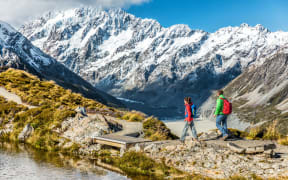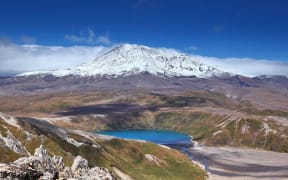
Emma Langley, 37, died after falling on Mt Ruapehu. Photo: Supplied / NZ Police
A coroner says a woman who died on Mount Ruapehu in 2020 might have survived if she'd received timely first-aid and been rescued sooner.
Emma Langley, 37, was on a day-long climb in September 2020, when she slipped while trying to cross an icy slope at Cathedral Rocks, above the Whangaehu Glacier.
She was seriously injured as she slid down the mountain and died of hypothermia, after a long wait for help.
She had attended a basic snowcraft course run by the Wellington section of the New Zealand Alpine Club a month earlier.
Coroner Matthew Bates said the group had climbed an icy ridge above the glacier to try to reach the plateau, in a deviation from its original plan.
Langley's Level 1 course had not equipped her with the skills to navigate the slope, he said, and while one of the leaders had instructed the hazard was best mitigated with a rope belay, Langley may not have heard this because of the raging winds.
"At no time was there any place for novice members of this group to be traversing steep sloping sections of ice where there was fall potential and no safety run-out below."
Emergency services were alerted just before 1pm, but bad weather prevented the rescue helicopter from reaching the glacier until about 9pm. Others in the party tried to keep Langley warm until help arrived, but she died while rescuers carried her off the mountain on a stretcher.
Coroner Bates said there should have been an assessment of what first aid or emergency equipment might be required immediately following the accident.
"Unfortunately, due to well-intentioned haste to get to Emma and render assistance, vital pieces of emergency equipment (for example items that could have been used to immediately insulate Emma from the frozen ground, wind, and cold generally) were left in the possession of the remainder of the group who were making the slow descent afterward."
A review by the Mountain Safety Council found trip leaders needed more instruction to understand how to stabilise a victim in an alpine environment, as injured patients were more susceptible to hypothermia.
It found the two most critical factors of the death were the group's location, which exposed them to a serious fall risk, and the fact that Langley was inadequately treated for shock and hypothermia following the accident.
It said stabilising her and providing suitable ground insulation and shelter should have been prioritised.
The coroner agreed, noting she was not put in a sleeping bag or sheltered from above for about four hours.
"She was not completely insulated in the sleeping bag, nor was she suitably insulated from the freezing ground beneath her, and it took nearly nine hours before she was adequately insulated from the freezing environment (wrapped and insulated from the ground inside a shelter)," he said.
"I cannot rule out the possibility that Emma may have survived if she was removed from the mountain much sooner after her accident, was spared from prolonged exposure to the elements, and received timely first-aid or medical input. However, that simply was not possible given her location and extreme weather conditions at the time."
Coroner Bates accepted the Mountain Safety Council's recommendation that instructors should receive at least two days of Outdoors First Aid training.
He found courses should teach fall prevention skills, like effective footwork and crampon techniques, at low-risk sites.
Instructors should not rely on beginners' being able to execute recently-learned skills while in stressful situations, he said.
The coroner also adopted an Alpine Club recommendation that Outdoor First Aid courses should include teaching on how to improvise stretchers using other equipment typically carried by climbing groups, such as alpine packs.




